We asked people in 24 countries whether they have confidence in U.S. President Donald Trump to deal with six major international issues. On each of these issues, majorities in most countries surveyed lack confidence in Trump.
Confidence is particularly low in neighboring Mexico and Canada, as well as in Turkey, Australia and many European nations, including France, Germany and Sweden. People often feel strongly: Pluralities in these countries tend to say they have no confidence at all in Trump on these issues.
Confidence in Trump is much higher in Kenya, Nigeria and Israel and, depending on the particular issue, also in Greece and Hungary.
To the degree that people differentiate across the six issues we asked about, they tend to have the least confidence in Trump’s handling of global climate change. Trump tends to get relatively higher ratings for his handling of U.S. immigration policies, although a median of only 36% across 24 countries express confidence in Trump on this issue.
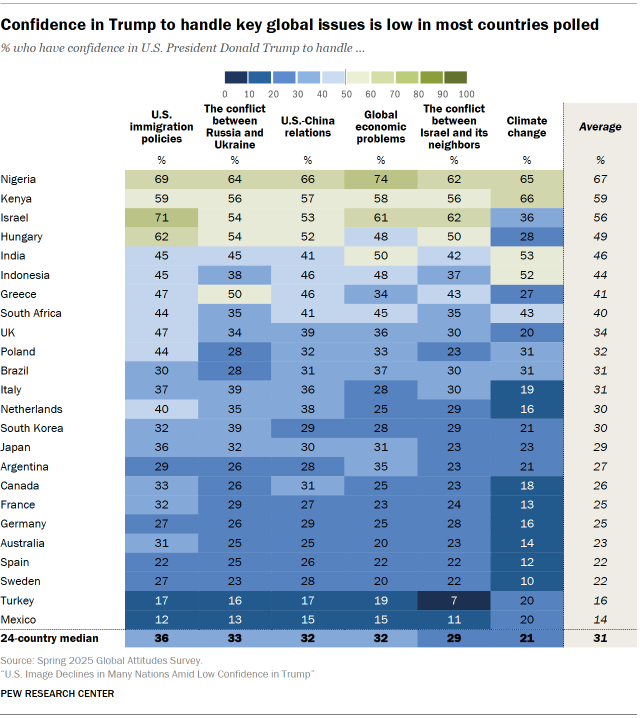
Views by ideology
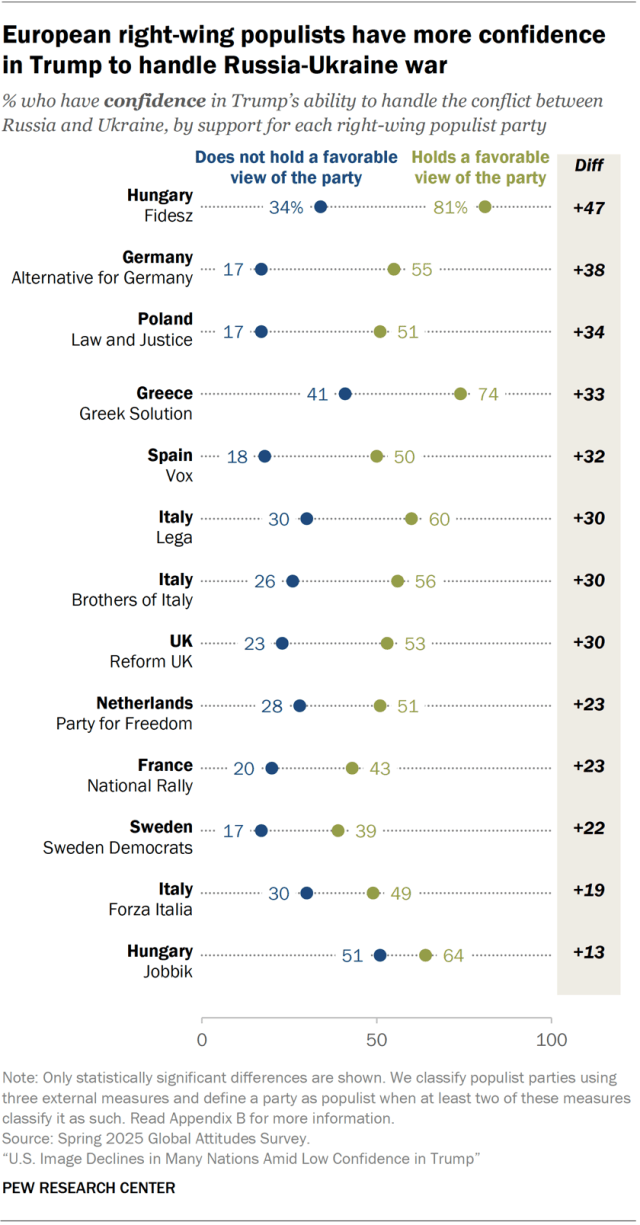
People who place themselves on the ideological right have significantly more confidence in Trump’s handling of each issue, when compared with people on the ideological left. These gaps are particularly large in Australia, Canada and Israel. (Australia and Canada both held recent elections in which observers say Trump and his rhetoric played a role.)
Across the six issues in the survey, ideological gaps tend to be largest on Trump’s handling of U.S. immigration policies.
Views by right-wing party support
People who support right-wing populist parties in Europe are significantly more confident in Trump to handle all of these issues, compared with nonsupporters.
Right-wing populists in many European countries are around two times as likely as their counterparts to have confidence in Trump’s handling of the conflict between Russia and Ukraine.
In some other countries, too, people who support a specific right-wing party tend to be about twice as confident in Trump on most issues, compared with nonsupporters. This pattern holds among supporters of:
- The Liberal Party in Brazil (the party of former President Jair Bolsonaro)
- Likud in Israel (the party of Prime Minister Benjamin Netanyahu)
- La Libertad Avanza in Argentina (the party of President Javier Milei)
- The People Power Party in South Korea (the party of former President Yoon Suk Yeol)
How confidence in Trump on specific issues relates to overall confidence
Confidence in Trump to deal with each issue strongly relates to confidence in Trump overall. People who are confident in him to handle global economic problems, climate change, relations with China, the Russia-Ukraine war, the conflict between Israel and its neighbors or U.S. immigration policies are all more likely to have confidence in the U.S. president overall.
Comparing assessments of Trump and Biden
Last year, we asked whether people approved or disapproved of how Biden was handling many of these same issues. Because our 2025 survey came at the beginning of Trump’s second term, we asked about confidence in him to deal with these things, rather than approval.
Across the issues we asked about last year, we found roughly four-in-ten approved of the job Biden was doing, with the exception of his handling of the Israel-Hamas war (31% approved). For more, read our June 2024 report: “Globally, Biden Receives Higher Ratings Than Trump.”
U.S immigration policies
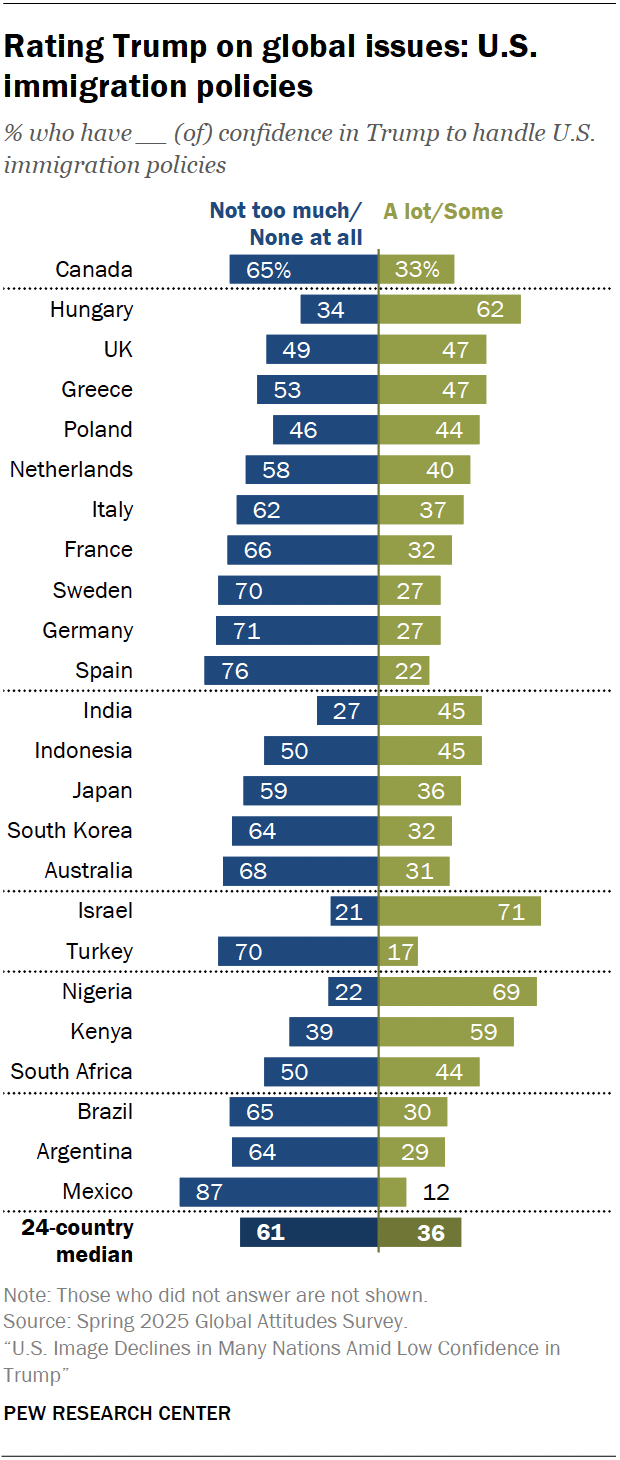
Across the 24 countries surveyed, a median of 36% have confidence in Trump to handle U.S. immigration policies, while a median of 61% do not.
People in Israel, Nigeria, Kenya and Hungary stand out for their relatively positive views, with around six-in-ten adults or more in each country saying they have either a great deal or some confidence in Trump’s handling of immigration. In India, more have confidence in him than not, though a large share is unsure.
Views are fairly divided in South Africa, Indonesia, Poland and Greece.
In the other countries surveyed, views are broadly negative. In Mexico, for example, 87% of adults lack confidence in Trump’s handling of immigration policies – including 62% who have no confidence in him at all. In Brazil, Canada, France and Germany, around half of the public or more also reports having no confidence at all in Trump on this issue.
Russia-Ukraine war
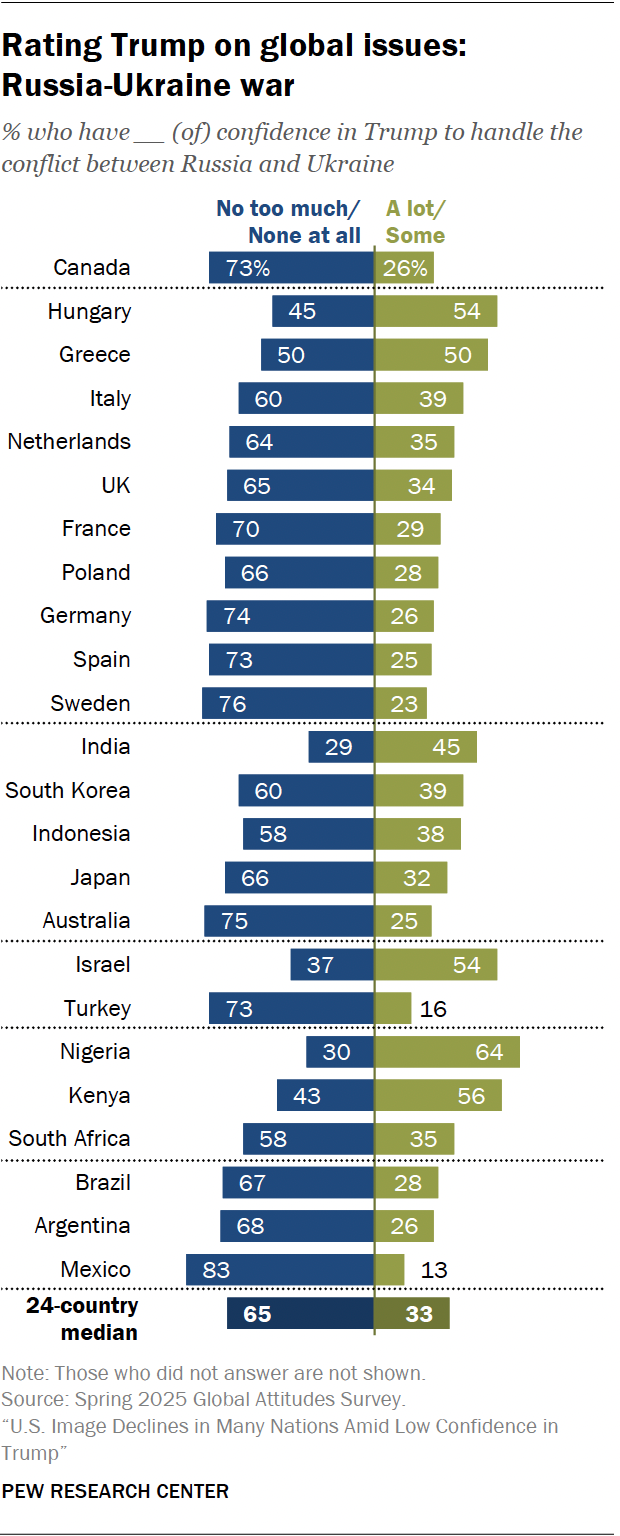
A median of 33% have confidence in Trump to handle the conflict between Russia and Ukraine, while a median of 65% have little or no confidence in him on this issue.
The survey was largely conducted after the Feb. 28 Oval Office meeting between Trump and Ukrainian President Volodymyr Zelenskyy. Read Appendix A for more information about our survey timeline.
People in Hungary, India, Israel, Kenya and Nigeria are all more likely than not to have confidence in Trump’s handling of this conflict, while people in Greece are divided.
Elsewhere, views are much less positive. Aside from Greece and Hungary, majorities in all the European countries surveyed express little or no confidence in Trump on his handling of the Russia-Ukraine war. In France, Germany and Sweden, around half of adults or more have no confidence in him at all.
Outside Europe, around three-quarters or more in Australia, Canada, Mexico and Turkey also lack confidence in Trump’s handling of the Russia-Ukraine war.
Global economic problems
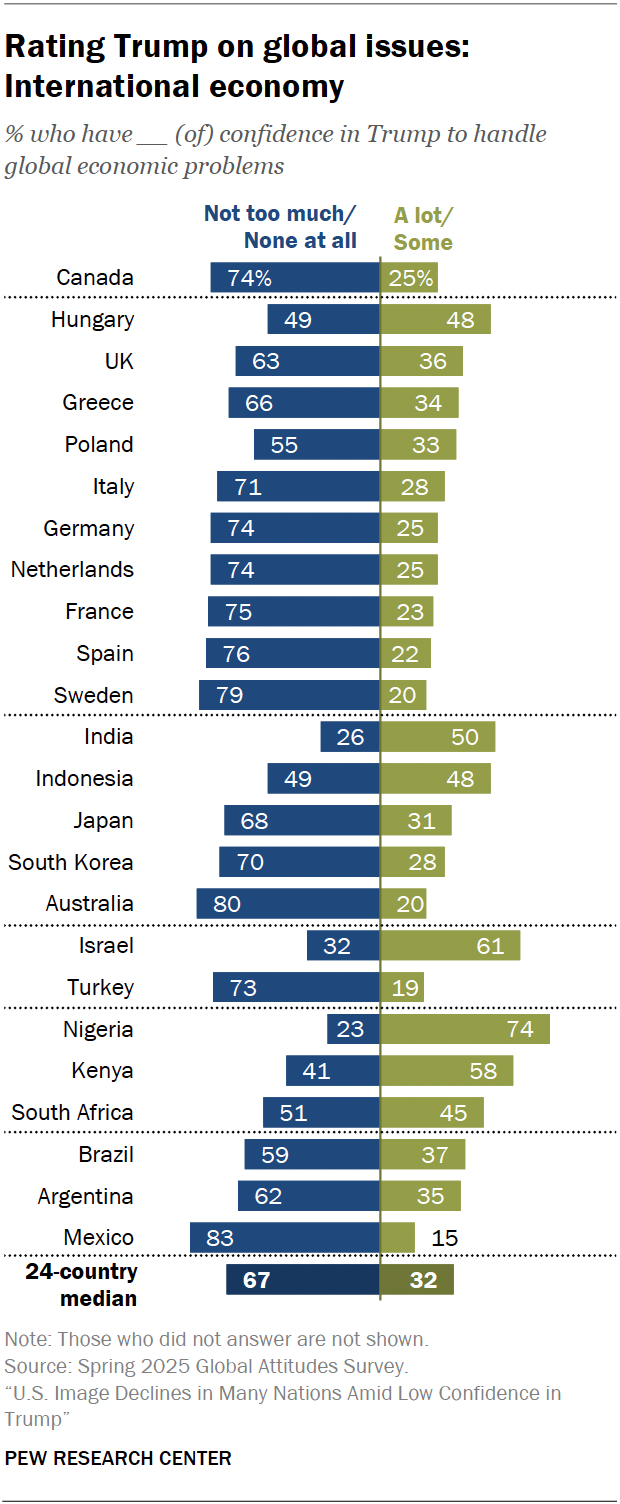
Across the 24 countries surveyed, a 32% median have confidence in Trump’s ability to handle global economic problems, while a 67% median do not.
The survey was largely conducted before Trump announced tariffs on countries around the world on April 2.
Confidence in Trump to manage global economic problems is relatively high in India, Israel, Kenya and Nigeria (though in India, a large share is unsure). Opinions are fairly divided in Hungary, Indonesia and South Africa.
In most other countries, confidence in Trump’s handling of the economy is limited. This is particularly the case in Mexico, where the survey followed weeks of shifting tariff policies affecting Mexican imports.
Indeed, in a majority of countries, only around a third of adults or fewer have confidence in Trump to deal with global economic problems – and in many, a large share of the public has no confidence at all. This is the case in Canada, which was also a target in early tariff discussions: 74% lack confidence in Trump’s economic policies, including 57% who have no confidence at all.
U.S.-China relations
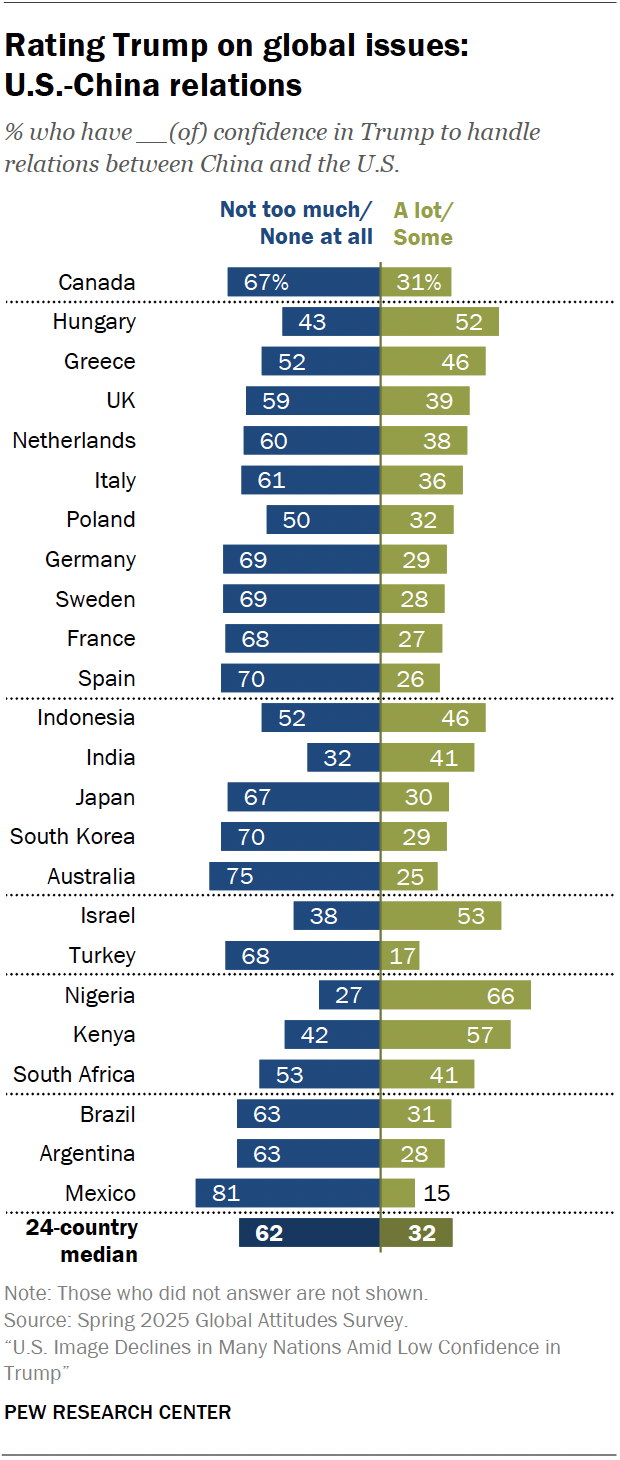
A median of 32% have confidence in Trump’s ability to handle relations between China and the U.S., while a median of 62% have little or no confidence.
In Hungary, Israel, Kenya and Nigeria, around half of adults or more are optimistic about Trump’s ability to manage this important bilateral relationship.
In the other surveyed countries, people are more pessimistic about Trump’s ability to handle U.S.-China relations. Views in Mexico are particularly negative, with 81% saying they have little or no confidence in Trump on this issue, including half who have no confidence in him at all.
In the Asia-Pacific region, no public surveyed is confident in Trump to manage U.S.-China relations. Last year, when we asked a slightly different question – whether people approved or disapproved of the way Biden was dealing with China – views were somewhat more positive in Australia, Japan and South Korea, and slightly less positive in India.
Conflict between Israel and its neighbors
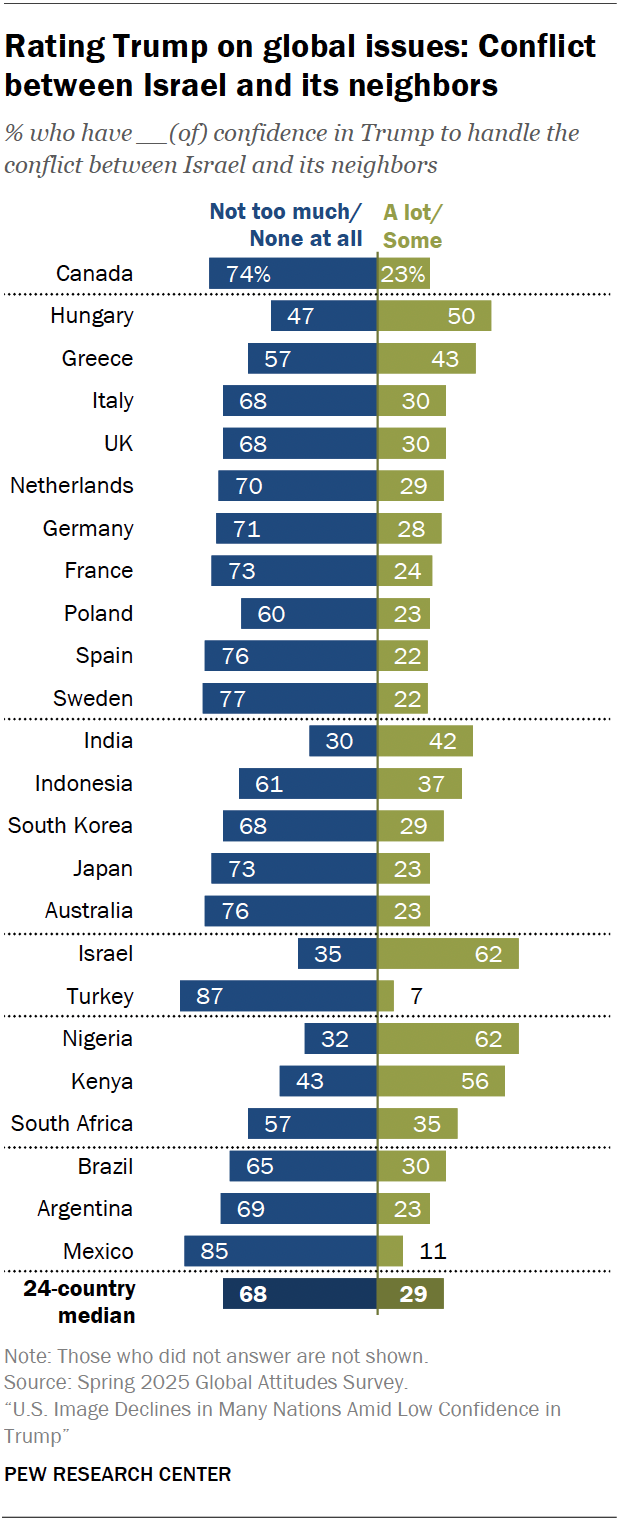
A median of 29% have confidence in Trump to handle the conflict between Israel and its neighbors, while a median of 68% do not.
In most countries, the survey was in the field on March 18, when the latest ceasefire deal between Israel and Hamas collapsed and hostilities resumed, although interviews were completed in Israel before March 18.
A majority in three countries have confidence in Trump on this issue: Kenya (56%), Nigeria (62%) and Israel (62%).
Views are fairly divided in Hungary and India (where large shares also say they are unsure). In all other countries surveyed, a majority of adults have little or no confidence in Trump.
Negative ratings are particularly widespread in Canada, Mexico, Sweden and Turkey, where a majority have no confidence at all in Trump to deal with the conflict.
Related: American views of how Trump is handling relations with Israelis and Palestinians
While confidence in Trump to handle this issue is fairly low, the same was true when we asked about Biden’s handling of the Israel-Hamas war last year. Interestingly, this is a rare issue on which negative views of Biden and Trump are concentrated on the same side of the ideological spectrum. People who place themselves on the left have less confidence than those on the right when it comes to Trump’s to handling of the conflict between Israel and its neighbors, much as those on the left approved less of Biden’s handling of the Israel-Hamas war.
- The ideological gap among Israelis on this issue is the largest of the 24 countries surveyed. Confidence in Trump on the right is nearly four times higher than on the left (83% vs. 21%)
- Israeli Jews (73%) are much more likely than Israeli Arabs (26%) to have confidence in Trump’s handling of the conflict between Israel and its neighbors.
Related: Israeli Public is Increasingly Skeptical About Lasting Peace
Climate change
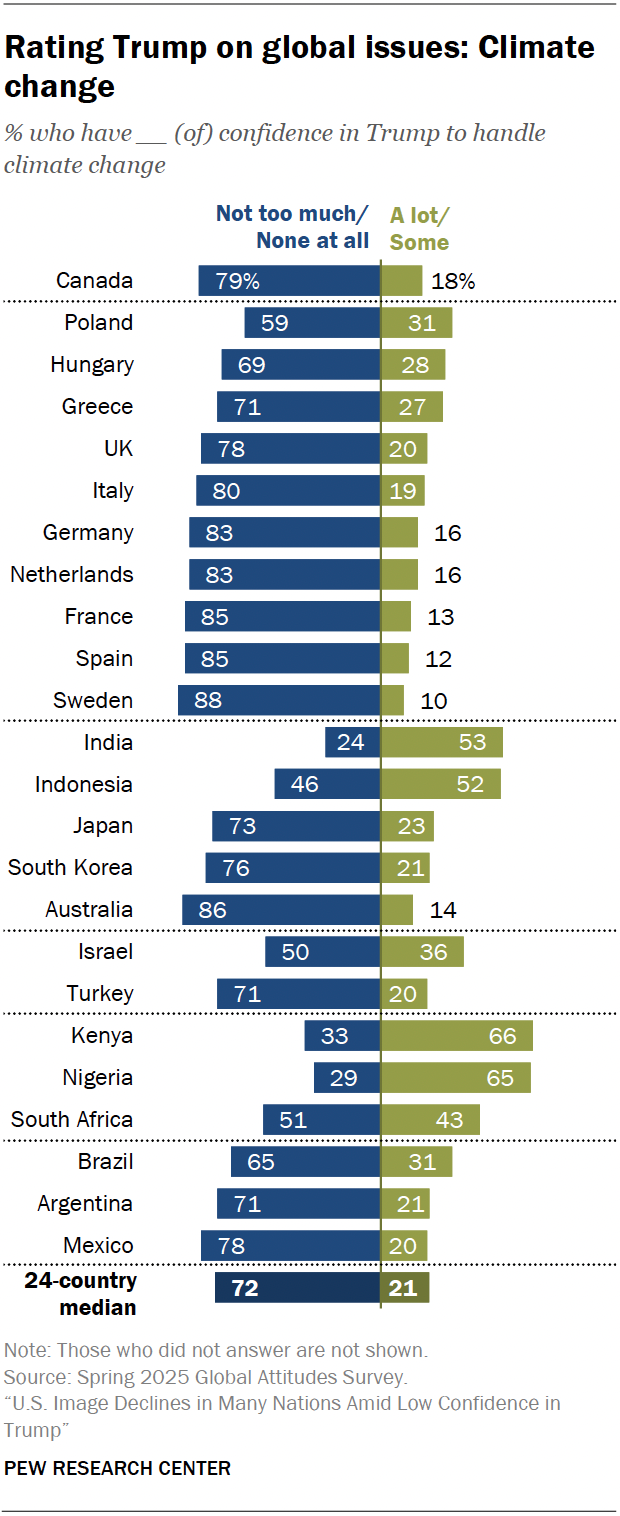
Trump, who entered office promising to withdraw the U.S. from the Paris Climate Agreement, receives his lowest ratings on the issue of climate change.
Across the 24 countries surveyed, a median of 21% have confidence in Trump to handle climate change, while a median of 72% do not. Only in four countries – India, Indonesia, Kenya and Nigeria – do around half of adults or more have confidence in him on this issue.
In nearly every other country surveyed, no more than around a third have confidence in Trump. A majority in each of the 10 European countries lacks confidence in Trump to deal with climate change. In the Netherlands, Germany and Sweden, around two-thirds or more have no confidence in him at all.




